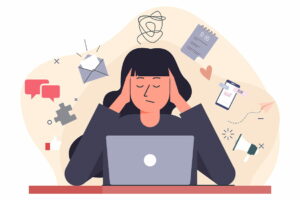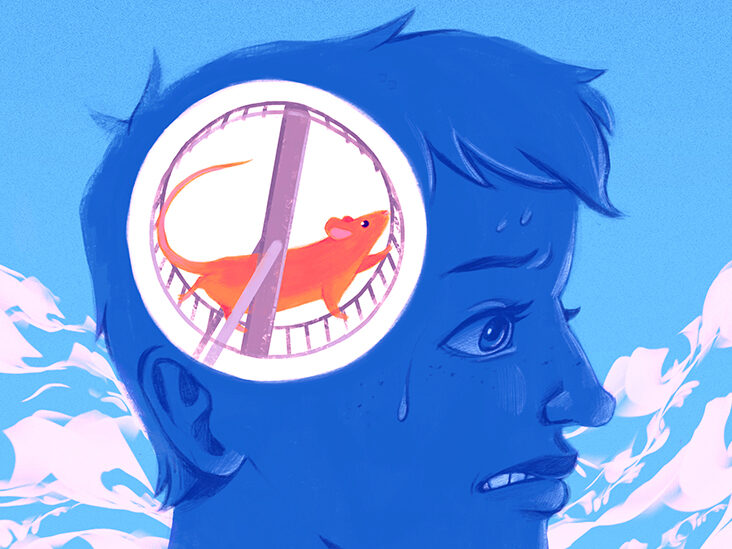Anxiety is a mental health condition that can affect anyone at any time. There are different types of anxiety, including social anxiety, generalized anxiety disorder, and panic disorder. Functional anxiety is a type of anxiety that is specific to certain situations or activities. If you are struggling with functional anxiety, don’t worry – you are not alone! In this blog post, we will discuss what functioning anxiety is, and how to deal with it in a healthy way.
Contents
Defining Functioning Anxiety
Functional anxiety is a type of anxiety that is specific to certain situations or activities. This means that if you are struggling with functional anxiety, it is likely due to a specific event or activity that makes you feel anxious. For example, you may have functional anxiety about going to work, speaking in public, or taking exams.
Functional anxiety can be mild, moderate, or severe. It is important to remember that everyone experiences anxiety differently, so what might be a mild case of functional anxiety for one person could be severe for another. It can also be difficult to identify functional anxiety, as it can often be mistaken for other conditions such as depression or social anxiety disorder.
Signs And Symptoms

There are a number of different signs and symptoms that may be associated with functional anxiety. These can include, but are not limited to:
- feeling nervous, restless, or tense
- having a sense of impending danger, panic, or doom
- increase in heart rate
- sweating
- trembling or shaking
- feeling like you can’t catch your breath
- feelings of dizziness, lightheadedness, or fainting
- feeling nauseous or sick to your stomach
- avoiding certain activities or situations due to anxiety
- difficulty concentrating
- feeling restless or on edge
- irritability
- muscle tension
- difficulty sleeping
These symptoms may differ from person to person and can range in severity. If you are experiencing any of these symptoms, it is important to seek professional help.
Causes
There are many different factors that can contribute to anxiety or related disorders. Although it is unclear and still in the process of research, Some of the possible reasons include:
- A family history of anxiety or other mental health conditions: If you have a family member who struggles with anxiety, you may be more likely to experience anxiety yourself.
- Changes in brain chemistry: Anxiety has been linked to changes in certain chemicals in the brain, such as serotonin and GABA.
- Stressful life events: experiencing a traumatic event or going through a major life change can trigger anxiety or make it worse. This includes things like divorce, the death of a loved one, job loss, or financial troubles.
- Traumatic experiences: If you have experienced a traumatic event, such as abuse, this can also lead to anxiety. This happens because the brain is trying to protect you from further harm by constantly being on alert for danger.
- Certain medical conditions: Some medical conditions, such as thyroid problems or heart conditions, can cause anxiety.
Effects On Daily Life

High functioning anxiety is a form of anxiety that can be difficult to spot, as it often looks like someone who is just really busy or stressed. This type of anxiety can be especially harmful, as it can lead to burnout. It is important to be able to recognize the signs of high functioning anxiety so that you can seek help if necessary.
Some of the impacts of high functioning anxiety include:
- Constant worry or stress: If you are constantly worrying about things or feeling stressed, this may be a sign of high functioning anxiety. This happens because your brain is always on alert for danger, even when there is no actual threat.
- Difficulty concentrating: When you are anxious, it can be difficult to focus on anything else. This can lead to problems with work or school, as well as difficulty completing tasks.
- Being unable to relax: You may find it difficult to relax, even when you are not doing anything. This can lead to problems with sleep and concentration.
- Exhaustion: Feeling constantly exhausted is one of the most common signs of high functioning anxiety. This is because your body is in a constant state of fight-or-flight, which takes a lot of energy.
- Changes in appetite: An increase or decrease in appetite is another common sign of high functioning anxiety. This is because when you are anxious, your body releases stress hormones that can affect your appetite.
- Irritability: If you are struggling with high functioning anxiety, you may find yourself feeling more irritable than usual. This is because anxiety can make it difficult to concentrate and can lead to feeling overwhelmed.
- Perfectionism: People with high functioning anxiety often have perfectionistic tendencies. This is because they are constantly striving to do more and be better.
- Trouble delegating tasks: If you have high functioning anxiety, you may find it difficult to delegate tasks. This is because you may feel like you have to do everything yourself in order to do it right.
- Procrastination: High functioning anxiety can also lead to procrastination. This is because you may feel like you have to do everything perfectly, which can be overwhelming.
- Difficulty saying “no”: People with high functioning anxiety may have difficulty saying “no” to others. This is because they often feel like they need to do everything, even if it is not possible.
- Being hard on yourself: People with high functioning anxiety are often their own worst critics. This is because they are constantly striving to do more and be better.
- Avoiding social situations: High functioning anxiety can also lead to avoidance of social situations. This is because you may feel like you are not good enough or that you will be judged.
- Physical symptoms: Physical symptoms are also common in high functioning anxiety. This is because the body is in a constant state of fight-or-flight, which can lead to things like headaches, muscle tension, and stomach problems.
If left untreated, these effects can build up and lead to more serious problems such as depression, substance abuse, and burnout.
Treatment Options

If you think you may be struggling with high functioning anxiety, there are treatment options available. These include:
Medication
Medication for anxiety disorders can be very effective. It is important to work with a doctor to find the right medication for you. These include:
- Selective serotonin reuptake inhibitors (SSRIs): They work by increasing levels of serotonin in the brain, which can help to improve mood and reduce anxiety.
- Serotonin and norepinephrine reuptake inhibitors (SNRIs): They work by increasing levels of both serotonin and norepinephrine in the brain, which can help to improve mood and reduce anxiety.
- Benzodiazepines: They work by reducing the activity of the nervous system, which can help to decrease anxiety and promote relaxation.
- Tricyclic antidepressants (TCAs): These work by blocking the reuptake of serotonin as well as norepinephrine, hence increasing their production.
- Monoamine oxidase inhibitors (MAOIs): This medication works by increasing the concentration of norepinephrine, serotonin, and dopamine, which contribute to the improvement of mood, happiness, and concentration and further soothing anxiety.
NOTE: If you decide to undertake medication for anxiety issues, it is important to stay in contact with your healthcare provider to monitor the medication’s side effects, allergic reactions, as well as efficacy on the individual.
Therapy
- Cognitive-behavioral therapy (CBT) is a type of therapy that can be very effective for high functioning anxiety. CBT focuses on changing the negative thoughts and behaviors that are associated with anxiety.
- Acceptance and Commitment Therapy (ACT) is another type of therapy that can be helpful for high functioning anxiety. ACT focuses on acceptance and mindfulness. This can help you to better understand and manage your anxiety.
- Eye Movement Desensitization and Reprocessing (EMDR) is a type of therapy that can help to reduce the symptoms of anxiety by processing and resolving trauma. It also helps to improve coping skills.
- Support Groups are also available for people with high functioning anxiety. This can be a great way to meet other people who understand what you are going through. It can also be a place to share tips and coping strategies.
High functioning anxiety can be a difficult thing to deal with, but there are treatment options available. If you think you may be struggling with high functioning anxiety, reach out to a mental health professional to get started on the path to recovery.
Self Help Tips
There are also some things that you can do on your own to help manage high functioning anxiety. These self-help tips include:
- Practice relaxation techniques such as deep breathing, visualization, and progressive muscle relaxation.
- Exercise regularly. Exercise can help to release endorphins, which can improve mood and reduce stress.
- Get enough sleep. Sleep is important for overall health and well-being. It is essential to get enough rest when dealing with high functioning anxiety.
- Eat a healthy diet. Eating a healthy diet can help to improve mood and energy levels. Incorporate plenty of fruits, vegetables, and whole grains into your diet.
- Avoid alcohol, caffeine, and drugs. Alcohol and drugs can worsen anxiety symptoms. If you feel like you need to drink or use drugs to cope with anxiety, reach out to a mental health professional.
- Challenge your negative thoughts. When you have a negative thought, take a moment to question it. Is it really true? What evidence do you have to support it?
- Practice self-compassion. Be gentle with yourself. Everyone makes mistakes and nobody is perfect.
- Focus on the present moment. One of the best ways to reduce anxiety is to focus on the present moment and not worry about what has happened in the past or what might happen in the future.
These are just some of the things that you can do to help manage high functioning anxiety. If you find that your anxiety is affecting your daily life, reach out to a mental health professional for help.
Conclusion
In conclusion, high functioning anxiety is a real and serious condition. If you think you may be struggling with high functioning anxiety, reach out to a mental health professional for help. There are also self-help tips that can be useful in managing high functioning anxiety. Remember, you are not alone in this. Millions of people struggle with anxiety every day. With treatment and support, you can overcome high functioning anxiety.
For more information, please contact MantraCare. Anxiety is a common mental health condition characterized by persistent feelings of worry, fear, and apprehension. If you have any queries regarding Online Anxiety Counseling experienced therapists at MantraCare can help: Book a trial Anxiety therapy session


